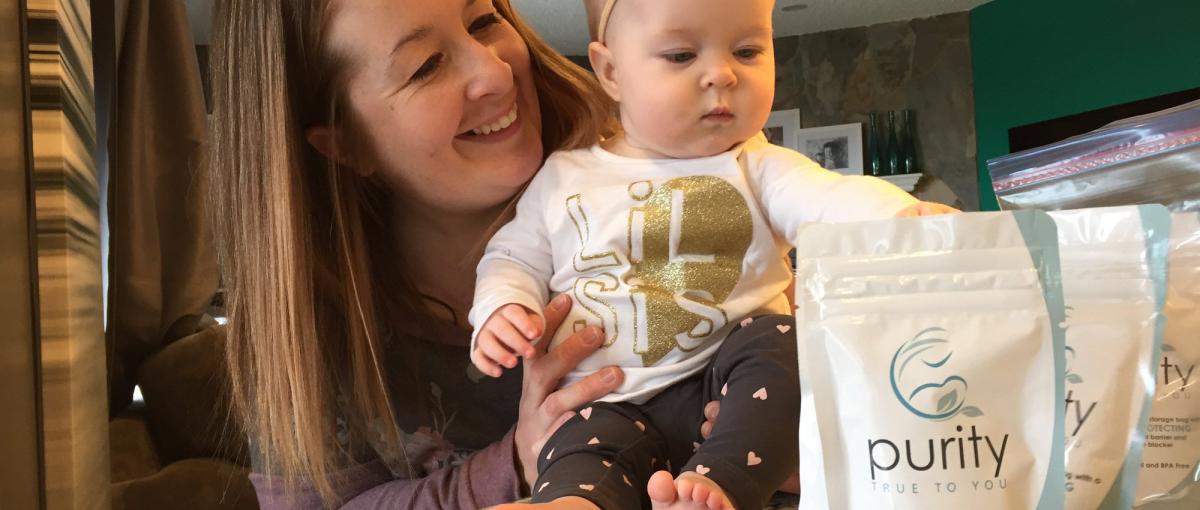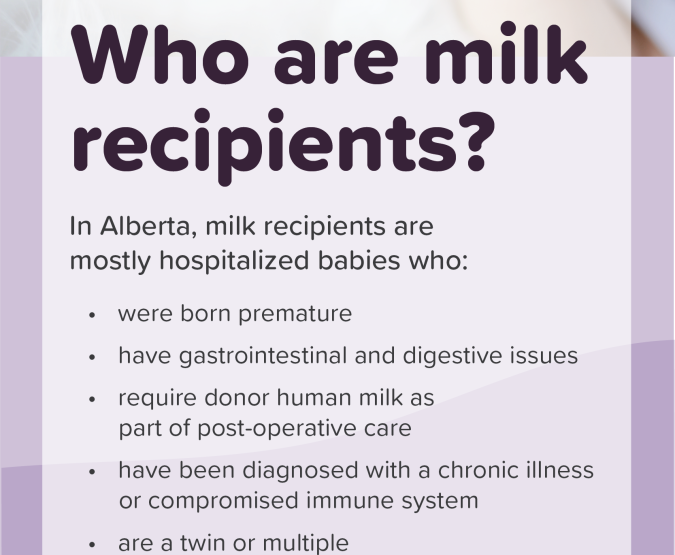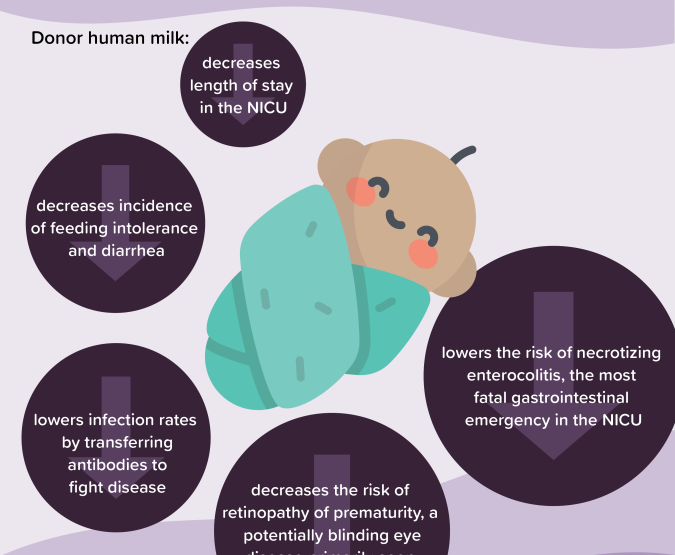Donations to milk bank help babies in the NICU
Grey Nuns hospital collects mothers' milk for newborns

April 22, 2019
By Marguerite Watson, senior advisor, content lead
When Lindsay Milne wasn't able to nurse her newborn, Eliyanah, she was glad to feed her donated human milk from the NorthernStar Mothers Milk Bank.
"It really wasn’t a question in my mind that it was the best thing to do right off the bat to get her as far ahead as possible," says Lindsay, 36.
Located in Calgary, NorthernStar Mothers Milk Bank is a non-profit organization that dispenses milk to sick and fragile babies in hospitals and communities throughout Canada. The organization uses milk donated by healthy breast-feeding mothers to 11 "milk drops" across the Prairies, including the Grey Nuns Community Hospital in Edmonton.
Born in May 2018 — five weeks prematurely and underweight — Eliyanah needed donated human milk when she was in the neonatal intensive care unit (NICU) at the Grey Nuns and Lindsay was waiting for her own breast milk production to begin. The experience of receiving milk for Eliyanah motivated Lindsay to become a donor to the Grey Nuns milk drop after she was able to start nursing.
"Knowing the nutritional value of breast milk, I think it’s an amazing gift to receive, and giving it is a great way to give back," says Lindsay.
The Grey Nuns became a collection depot for the Calgary milk bank about six years ago to align with research from the World Health Organization and UNICEF that supports the benefits of breast milk, says Margaret Salopek, clinical nurse educator, postpartum and antepartum units at the hospital.
"The research showed that breast milk is easier for premature or sick babies to digest than formula and provides protective factors that help them get better faster," Margaret says.
Mothers bring their milk donations in pre-sterilized collection containers or bags to the hospital, which stores them in a freezer at a carefully monitored temperature. Twice a week, volunteer drivers for the NorthernStar Mothers Milk Bank pick up the milk and take it to Calgary for pasteurization. To cover costs, the hospital then buys milk from the bank for babies in the NICU. The milk is given to babies by prescription only.
Who are milk recipients?
In Alberta, milk recipients are mostly hospitalized babies who:
- were born premature
- have gastrointestinal and digestive issues
- require donor human milk as part of post-operative care
- have been diagnosed with a chronic illness or compromised immune system
- are a twin or multiple
- don't have access to their mother's own milk (e.g., due to adoption, surrogacy, mastectomy, breast reduction or illness)
- don't have safe access to their mother's milk (e.g., the mother has an infectious disease or illness or is undergoing radiation or chemotherapy treatments)
Source: northernstarmilkbank.ca

Becoming a donor to the milk bank is a structured process, Margaret says. Mothers are screened through a phone interview, a written questionnaire, a document completed by their healthcare provider and a blood test. Once approved, they are given detailed instructions about collecting and storing their milk and asked to donate a minimum of 4.5 litres within the first year after giving birth. Donating is completely voluntary.
"Becoming a donor might seem a little overwhelming in the beginning, but once you get into it, it’s not difficult at all," says Lindsay. "You’re already pumping and sterilizing, so it’s really nothing different. It doesn’t take any more time."
And there's no need to worry that you won't have enough milk for your own child since it's easy to surpass the initial commitment, Lindsay says. "It's not a monthly commitment. It’s not a weekly commitment. It’s what you can, when you can."
So far, in the nine months that she's been participating in the program, Lindsay has donated over 15 litres through the Grey Nuns depot. With Eliyanah starting to eat solid food, Lindsay says she'll be able to donate more, about one or two litres a week.
In all, the NorthernStar Mothers Milk Bank dispensed more than 5,600 litres of donor milk in 2018 through contributions from just over 700 donors. Considering the benefits of pasteurized human milk, Margaret would like to see more donor human milk programs in Canada. Besides the milk bank in Calgary, which is community-based, there are only three other programs across the country. Vancouver and Toronto have hospital-based milk banks, and Montreal has a milk bank run by the Quebec blood service.
"It would be really nice if every major city had its own milk bank, not just the depots. We could serve more populations, not just populations at risk," Margaret says.
Since being both a recipient and a donor of human milk, Lindsay has been telling pregnant friends, along with new moms, about the NorthernStar Mothers Milk Bank. And she plans to continue donating until Eliyanah turns one.
"It's a wonderful program. You hope you never have to use it, but when you do, it’s such a safe gift that you’re able to get and that you’re able to give, if you can do it, to really make a difference for all the little ones," Lindsay says.
Benefits of human milk
Human milk is specific to feeding human babies. It contains a perfect combination of protein, carbohydrates, fats, vitamins and minerals that can't be reproduced in formula.
Donor human milk:
- decreases length of stay in the NICU
- decreases incidence of feeding intolerance and diarrhea
- lowers infection rates by transferring antibodies to fight disease
- decreases the risk of retinopathy of prematurity, a potentially blinding eye disease primarily seen in premature babies
- lowers the risk of necrotizing enterocolitis, the most fatal gastrointestinal emergency in the NICU
